How to Choose a Budget-Friendly Web Host Without Sacrificing Performance

Launching a website is an exciting step, whether you're starting a blog, an online portfolio, or a small business. One of the first and most critical decisions you'll make is choosing a web host. While it’s tempting to go for the absolute cheapest option, that can often lead to slow loading times, frequent downtime, and a frustrating experience for your visitors.
The good news? You don’t have to break the bank to get reliable performance. With a strategic approach, you can find affordable web hosting that delivers excellent value. Here’s how to navigate the market and make a smart choice.
1. Understand Your Actual Needs
Before you even look at prices, ask yourself what you need. A simple blog or small business website has very different requirements than a large e-commerce store.
-
For starters: A basic shared hosting plan is often perfect. You share server resources with other sites, which keeps costs incredibly low. Modern shared hosting is powerful enough for most new websites.
-
For growing sites: If you expect more traffic or run a resource-heavy site, look for providers that offer scalable options like VPS (Virtual Private Server) or cloud hosting at competitive prices.
2. Prioritize Performance Fundamentals
"Affordable" should never mean "slow." Look for these key performance indicators hidden in the specs:
-
SSD Storage: Ensure the host uses Solid-State Drives (SSDs) instead of older hard disk drives (HDDs). SSDs dramatically improve website loading times and are now standard among quality budget hosts.
-
Resource Limits: Check the limits on bandwidth (data transfer) and storage. "Unlimited" is common but often has fair usage policies. Ensure the limits are generous enough for your planned growth.
3. Don’t Overlook Crucial Features
A low price tag can be misleading if essential features cost extra. Your affordable web hosting plan should include:
-
Free SSL Certificate: This is non-negotiable. It encrypts data and is vital for security and SEO (Google ranks HTTPS sites higher).
-
One-Click Installs: Easy installation for platforms like WordPress saves you time and technical hassle.
-
Email Accounts: Many budget hosts include professional email addresses (info@cloudmailstore.com) at no extra cost.
4. Scrutinize the True Cost
The advertised price is often an introductory rate. Always check:
-
Renewal Price: What will you pay after the initial term? This is the real cost of your hosting.
-
Length of Commitment: The best rates usually require a longer sign-up period (e.g., 12 or 36 months).
5. Trust, But Verify with Reviews
A provider’s own website will always highlight its strengths. Go beyond that. Read independent user reviews and testimonials to get the real story on:
-
Uptime Reliability: Is the site consistently available?
-
Customer Support: Is support helpful and responsive when you have an issue?
The Bottom Line
Finding powerful affordable #web #hosting is about balancing cost with value. By focusing on your needs, prioritizing performance basics like SSDs, and carefully reviewing what’s included in the plan, you can secure a hosting partner that supports your website’s growth without sacrificing the speed and reliability your visitors expect. Invest a little time in research upfront, and your website—and wallet—will thank you later.



